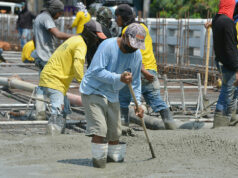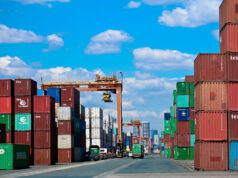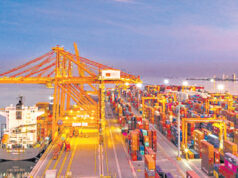Economy on track to grow by at least 7% this year
By Melissa Luz T. Lopez, Senior Reporter
DAVAO CITY — The Philippines is on track to achieve at least seven percent growth this year, with the tax reform providing “fiscal firepower” to support infrastructure spending and boost investments, economic officials said.
Finance Secretary Carlos G. Dominguez III said the economy has enough room to further boost public spending and attract more investments, which will fuel faster growth in gross domestic product (GDP).
“This year, with a fortuitous convergence of trends, we fully expect to grow our economy at seven percent or better. The infrastructure program will provide the strong stimulus for growth. With substantial investment inflows, we aim to make our economic development investments-led,” Mr. Dominguez said during the Philippine Economic Briefing held at the SMX Convention Center in SM City Lanang Premier on Friday.
Philippine GDP expanded by 6.7% last year, slower than 2016’s 6.9% but still within the government’s 6.5-7.5% target range. The Duterte administration is targeting annual growth to log between 7-8% this year until 2022.
Mr. Dominguez said the P8-trillion infrastructure program under the state’s “Build, Build, Build” initiative will provide the necessary support for rapid expansion.
Bangko Sentral ng Pilipinas (BSP) Deputy Governor Maria Almasara Cyd Tuaño-Amador pointed out that the Tax Reform for Acceleration and Inclusion (TRAIN) law has provided “fiscal firepower” for the Executive to pursue its ambitious spending targets.
The government expects to collect an additional P82.3 billion from the TRAIN, which imposed additional taxes on fuel, cars, coal, sugar-sweetened drinks and a host of other items starting Jan. 1.
These new revenues will help fund plans to spend between P8-9 trillion priority infrastructure, which involve at least 75 big-ticket projects nationwide.
FOCUS ON MINDANAO
The Duterte administration is especially focusing on Mindanao for development, with five priority projects located in this region.
“The island is the focal point of major infrastructure projects that will enhance economic production, open new irrigated lands for our agriculture and make the movement of goods and people easier,” Mr. Dominguez said as he led the Davao leg of Asian Development Bank (ADB) meetings.
The Philippines is the host of this year’s ADB annual meetings, which will culminate on May 3-6 in Mandaluyong City.
The government is relying on funding aid from the ADB for several projects, including the $380-million loan to improve around 280 kilometers (km) of national roads and bridges in Zamboanga and Tawi-Tawi, and the $70-million Davao Public Transport Modernization Project.
The loan deal for road repairs was signed in January, while public transport reforms for Davao are currently at the design stage, said ADB country director Kelly Bird.
Other projects set for rollout are the P5.4-billion Malitubog-Maridagao Irrigation Phase 2 in North Cotabato and Maguindanao; the P4.86-billion Panguil Bay Bridge; and the expansion and improvement of the airports in Davao and Laguindingan worth P40.57 billion and P14.6 billion, respectively.
Meanwhile, the first phase of the P35.26 billion Mindanao Railway Project which will connect Davao City, Tagum and Digos will break ground within the third quarter, according to the Transportation department.
SPENDING SUSTAINED
Rolando U. Toledo, director at the Department of Budget and Management (DBM), added that bigger disbursements will boost investments and overall GDP growth.
“The passage of the TRAIN law and the 3% deficit target will allow us to spend more over the medium term,” Mr. Toledo said. “This reign of government spending will sustain the growth momentum with the GDP expanding by 7-8% over the medium term.
This budgetary strategy is sound, appropriate and sustainable.”
For 2018 alone, the DBM has earmarked P1.1 trillion for public infrastructure, equivalent to 6.1% of GDP and accounts for nearly a third of the P3.767-trillion spending plan.
Government spending picked up by 11% to P2.824 trillion in 2017 but missed the P2.909-trillion spending target, according to Treasury data. Infrastructure spending totalled P568.8 billion last year, jumping by 15.4% from the P493 billion released in 2016 and surpassing the P549.4 billion target under the 2017 budget.



